Weathering It
Dedicated to Mary Capozzi
The other night we are struggling with the Final Jeopardy question when there is a loud, ugly buzz/beep that interrupts the show and the words move across the screen: “There is a tornado watch in the following counties….Montgomery, Chester, Delaware, Bucks…”
“Oops! Bucks! That’s us!” I exclaim.
Polley corrects me. “That is we. Predicate nominative.”
“So do we go to the basement or what?”
I soon learn from online research that tornado “watch” means the conditions are ripe for a twister in the designated areas. Tornado “warning” translates into the fact that an actual roof remover is moving through the region.
Maybe because I was just a kid of six or seven, but I don’t remember the weather being so complicated when I grew up in the Bronx in the nineteen fifties. My favorite part of the news was, in fact, the weather. I watched the black and white telecast every night with my parents.
Tex Antoine, sporting a smock, would stand in front of a wooden easel. As Tex began telling us about the weather conditions, he would make a line or two with his marker, and as he continued talking he would add more lines, straight lines, curved lines, rectangles, circles, and I was trying to guess what cartoon would eventually emerge from these drawings.
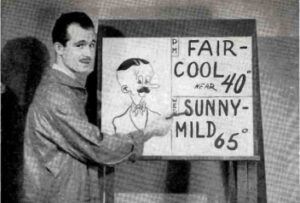
The drawing would always end up as Mr. Weatherbee, but the drama unfolded based on what Mr. Weatherbee would be wearing or carrying. Sport coat, raincoat, umbrella? The suspense kept me riveted to the screen.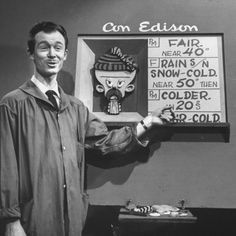
The weather seems to have become more complicated over the years.
Whereas Tex gave us all we needed to know about dressing for the morrow in two minutes, weather forecasts on the televised news shows take up about five or six minutes. Maybe more. And the “storm of the century” seems to happen every year.
My weather app shows me vividly colored radar images that my mind has to sort out. Other views demand that I have a working knowledge of isobars and contour lines and all kinds of numbers.
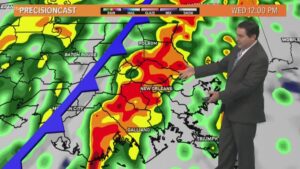
In order for me to prepare to meet nature on the next day, television weather forecasts tell me I have to know so much more. I think absolute humidity is more commanding than the lax relative humidity. Tex never made the distinction. Nor did he emphasize how things feel. If Tex said that it was going to be 95 degrees when we woke up, we assumed it would be uncomfortable. Today, besides knowing the temperature will be 95 degrees, we must study the heat index which describes how that temp feels on the skin. The opposite temperature extreme is also true. “The high will be 28 degrees, but, with the wind chill factor it will feel like 2 degrees below zero.” Now that I have to factor in the wind, I should study the Beaufort Wind Scale.
And here is one of those situations where science doesn’t help as much as the humanities. Let me explain. Jack London wrote a short story, To Build a Fire, a tale about a man who ventures outside his cabin when it is 82 degrees below zero. Yes, that is right. 82 degrees below zero. His dog cannot read a thermometer, but he knows that no living thing should be outside when it is that cold. The man loses his life because he is not as smart as his husky.
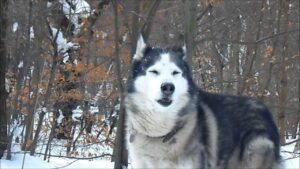
Telling me that it “will feel like two degrees below zero” doesn’t really mean much to me. I think weather forecasters should employ similes and metaphors, the DNA of the humanities. So, people, with the wind chill factor tomorrow it will feel like an ice cube placed on the back of your neck. Or, it will be so cold tomorrow that it will feel like your spouse’s cold toes rubbing against your ankles. Or, it will be so hot tomorrow that it will feel like stepping barefooted on a black macadam street on a hot sunny day down the shore. Or it will be so warm it will feel like opening the oven door when the turkey is done and your glasses fog up. See? Now those forecasts have meaning.
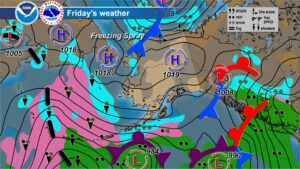
Cold fronts bad? Maybe not if they bring sunshine. Warm fronts good? Maybe not if they bring precipitation. And the local weather stations have a way of making me become concerned about weather outside my immediate area. I must expand my database knowledge to include El Nino winds and the jet stream. I get nervous watching the national map and seeing that heavy rains and strong straight-line winds (whatever they are) over St. Louis will arrive in my area by the weekend. Tex could never draw these maps in two minutes.
Nor could Tex use satellite maps or green screens using animations or laser pointers. Nope. Just Tex and his easel and Mr. Weatherbee and the spoken word. And that limitation, the spoken word, led to one of the more embarrassing moments of my youth. Sixth grade. We had just moved from the Bronx to a suburb in New Jersey. Close enough to New York City to still watch Tex deliver the weather report. Mr. Fox, my kindly sixth grade teacher distributed our graded essays to the class. I had written my essay about the British attempt to take Fort Ticonderoga during the French and Indian War. I noticed that Mr. Fox had circled in red a phrase I had written, and he superimposed a large red question mark on my work. I raised my hand.
“Mr. Fox, why did you circle this sentence?”
“Ralph, I cannot see your paper from here. Please read it.”
I cleared my throat and looked around the room at my brand new sixth grade classmates whose eyes were all on me.
“In the early morning, British scouts, using the cover of an Apache fog, crept toward the fort to count the cannon and see how heavily manned were the parapets.” What’s wrong with that?, I thought.
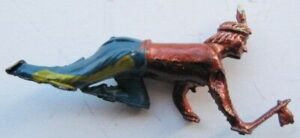
Mr. Fox crossed his body with one arm and rested the elbow of his other arm upon it, finger to his lips. “What is an Apache fog?”
Apache fog? I had heard Tex Antoine talk about Apache fogs dozens of times. “Yes, sir. Apache fog. You know, a fog that lies close to the ground and the Apaches would use it to crawl under as they approached a fort. Apache fog.”
Mr. Fox looked toward the ceiling. Revelation. “Ah, I see. You mean ‘patchy fog.’” He wrote the words on the blackboard.
Patchy fog? What the hell was that? I immediately crawled into myself, sat down and disappeared beneath my desk and through the floor down to the center of the earth.
A few years later, watching another news, I saw the forecast which included “patchy fog.” How plebian. Apache fog was so much more romantic and mystifying.
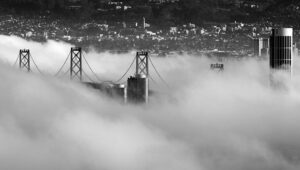

Whether we want it to or not, weather plays an important part in our lives. For one thing, it is the safest topic to initiate a conversation with strangers. Pre Covid I would go to our workout gym, do my exercises, and take a shower. When fifteen guys all with nothing but towels around their waists, are crammed into a small space while getting dressed, safe topics are the norm. No one says to the stranger dressing next to him, “So, what is your opinion of Edgar Allan Poe’s Philosophy of Composition?” No one asks the gentleman next to him as he applies deodorant, “So, what is your take on Heisenberg’s Principle of Uncertainty?” No. It is almost always the weather.
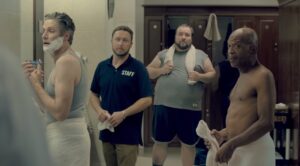
“Man it sure is cold out there!”
“Yep. I don’t remember growing up having these many cold days in a row?” Past weather is always a safe topic. So is future weather.
“Me either. They say it’s gonna be even colder this weekend.”
“Yep.”
For all social events when meeting strangers, talking about the weather is a gateway conversation.

“Oh do try the kale and chive dip. It is delicious. Did you hear on the weather that they are expecting severe thunderstorms this weekend?”
I try to fish my broken tortilla chip out of the kale and chive dip. “No, I didn’t hear that.”
“Really. What news do you listen to?”
“Um, channel six.” I almost got the chip out and am trying to scrape off the excess dip without garnering too much attention.
“Oh. Well, Harold and I listen to Clarabelle Norton. She’s our favorite weather person.
Yes. People do have their favorite weather forecasters. Viewers are enormously loyal to their favorite weather forecasters and will trust no others, even though they all get the weather information from the same place.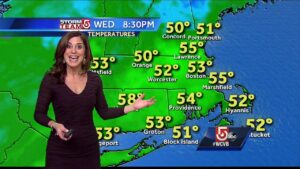
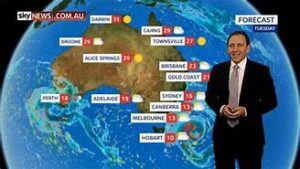
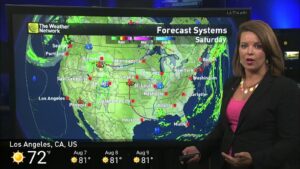

Some people watch the weather report three or more times a day, especially if bad weather is forecasted. I am not one of those people. I figure with the pandemic, I am not going out much anyway, and even if I could, there is not much I could do about the weather. Take it from a guy who has flyfished in downpours. With the pandemic, I am staying indoors most of the time….Yes. This pandemic is even tough on burgulars.
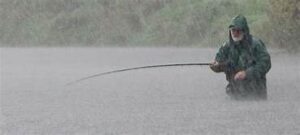

Getting wet is not that bad. Though I still get jumpy at certain weather buzz words, like black ice. And I am confused about some terms and predictions. For example, what is the difference between mostly cloudy and partly sunny? Between sleet and freezing rain? Does nature know that storms should follow along the I-95 corridor? Or stop, for that matter, at the I-95 corridor?
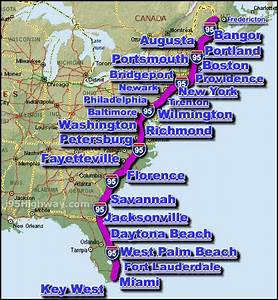

I read that the National Weather Service does a really good job predicting the weather, but I also read that local weather reports on television up bad weather by twenty percent. This means that if the NWS predicts a forty percent chance of snow in my area, the local news will predict a sixty percent chance of snow. Why? Because bad weather sells. Bad weather gets our blood boiling. Bad weather keeps us tuned into the television station.
“Top story on the six o’clock news is a tornado has formed in our area with winds over 160 miles an hour, dangerous enough to tear off roofs and destroy power lines!!! Tune in at eleven to find out where it will touch down.

In comparison, good weather is, well, boring. “Tomorrow sunshine all day with moderate temperatures.”
Nowadays the televised weather reports are designed to get me agitated, all worked up. Sometimes I long for the days when Tex Antoine and Mr. Weatherbee made it seem all simple and safe. Put on a hat, carry an umbrella and you are ready for anything. If you get up early in the morning, you might even catch a low lying Apache fog blanketing the park.
Today I still don’t see how knowing what the dew point will be will affect how I dress for the tomorrow.
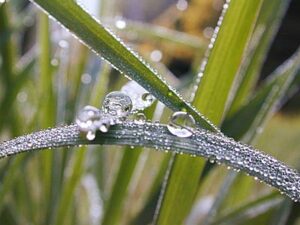

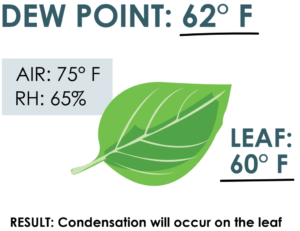
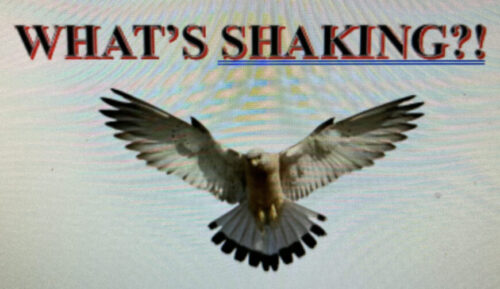

Hi Ralph,
Frank and I enjoyed meeting you and Polley yesterday.
I found your blog. Loved your piece on the weather. We remember
Tex Antoine fondly. (Before he got into trouble)
Jane